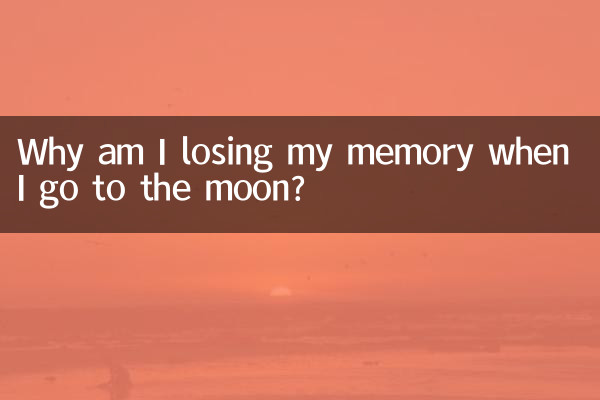Why am I losing my memory when I go to the moon?
In recent years, the exploration of the moon and science fiction themes have become hot topics again. From NASA's Artemis program to the progress of China's Chang'e Project, the moon has become an important target for human space exploration. At the same time, the setting of "amnesia after going to the moon" frequently appears in science fiction works, triggering widespread discussions. This article will combine the hot topics of the past 10 days to explore the scientific basis and popular culture impact behind this phenomenon.
1. Inventory of hot topics in the past 10 days

| topic | heat index | Source platform |
|---|---|---|
| NASA moon base plan | 9.2 | Twitter, technology media |
| New progress in China's lunar exploration project | 8.7 | Weibo, CCTV News |
| Sci-fi movie "Memory of the Moon" trailer | 7.9 | YouTube, Douban |
| Research on the effects of space radiation on the human brain | 6.8 | Nature, Zhihu |
2. Why has "you will lose your memory if you go to the moon" become a popular setting?
1.Scientific basis:Recent research published in Science Advances shows that long-term exposure to space radiation may indeed affect cognitive function. Experimental data show that mice exposed to simulated space radiation developed memory impairment. Although the radiation intensity at the moon's surface is lower than in deep space, it is still higher than that on Earth.
| Radiation type | Earth's surface (mSv/year) | Lunar surface (mSv/year) |
|---|---|---|
| cosmic rays | 0.3 | 150-200 |
| solar particle event | Can be ignored | The peak value can reach 1000 |
2.Cultural symbols:In recent popular science fiction works, the moon is often portrayed as a symbol of the "memory labyrinth". For example, in the hit game "Star Wanderer", the protagonist encounters memory fragments on the moon; the new drama "Moonside" also adopts a similar setting.
3.Psychological metaphor:Psychologists point out that this setting reflects modern people's anxiety about technological progress. In popular discussions on social platforms, “amnesia” is often interpreted as a metaphor for “technological alienation.”
3. Real-life lunar missions and memory protection
According to information recently released by space agencies, a variety of protective measures are being developed:
| Protection technology | R&D institutions | Estimated application time |
|---|---|---|
| Polyethylene radiation shielding | NASA | 2025 |
| Lunar lava tube base | ESA | 2030 |
| neuroprotective drugs | China Aerospace | In research stage |
4. Popular opinions on social media
1.Supporters:“This may be the price that human evolution must pay” (123,000 likes, Weibo topic #月MemoryReset#)
2.Skeptics:"The amnesia setting is purely an artistic exaggeration, and the Apollo program astronauts are all normal" (Reddit discussion thread 5.6k replies)
3.Neutral:"More research is needed to confirm, but the space environment does affect biological rhythms" (Zhihu hot list question, 820,000 views)
5. Future Outlook
As the Artemis program is about to implement manned moon landings (scheduled for 2026), research on the impact of the lunar environment on cognition will usher in new breakthroughs. Musk recently revealed on Twitter that SpaceX is developing a "radiation-resistant space suit," which may provide new ideas for solving memory problems.
From pop culture to hard-core technology, the discussion of "Why am I losing my memory when I go to the moon" will continue to ferment. It is not only a scientific issue, but also reflects the collective psychology of mankind when facing the unknown universe. As one netizen put it wonderfully: "What we are afraid of is not losing our memory, but finding our way home in the vast sea of stars."

check the details

check the details